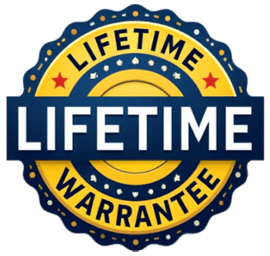

The Impact of Cooking with Hard Water on Food Quality in Florida
Cooking is an art that requires precision, especially when it comes to the ingredients used. One often overlooked factor that can significantly affect the taste and quality of your meals is the water you use. In Florida, many households deal with hard water, which is characterized by high levels of minerals such as calcium and magnesium. This article explores how cooking with hard water can alter the flavor, texture, and overall quality of food, particularly in the context of Florida’s unique water supply challenges.
Note: It’s important to make the point early and up-front in this article, we are not endorsing cooking with untreated, unpurified tap water — but for many, it’s their only choice. This article has mitigation strategies that may — or may not — work. For those who genuinely care about water quality, nothing is going to come close to the purification option offered by reverse osmosis. Reverse Osmosis or RO water is water which is process through a semipermeable membrane designed to only allow water molecules to pass through it, ensuring the best possible water remains.
Understanding Hard Water
Hard water is defined by its high mineral content, primarily calcium and magnesium. These minerals are naturally occurring and are often found in groundwater sources, which are prevalent in Florida due to the state’s limestone geology. The U.S. Geological Survey indicates that Florida’s water can contain significant levels of calcium carbonate, leading to various issues in cooking and food preparation.
The Composition of Hard Water
- Calcium: This mineral contributes to the hardness of water and can affect the texture of food.
- Magnesium: Similar to calcium, magnesium can influence the cooking process and the final taste of dishes.
- Other Minerals: Hard water may also contain trace amounts of iron and manganese, which can impart undesirable flavors and colors to food.
Understanding the composition of hard water is crucial for recognizing its potential impact on cooking.
Effects of Hard Water on Cooking
Cooking with hard water can lead to several undesirable outcomes, affecting both the preparation process and the final dish. Here are some of the primary effects:
Altered Flavor Profiles
One of the most noticeable impacts of hard water is its effect on the flavor of food. The minerals present can impart a distinct taste, which may not be pleasant. For instance, dishes prepared with hard water may have a metallic or chalky flavor, detracting from the intended taste of the ingredients.
Texture Changes in Food
The minerals in hard water can also affect the texture of various foods. For example, when boiling vegetables, the high mineral content can cause them to become tough or rubbery. This is particularly true for fibrous vegetables like carrots and green beans, which may not soften as expected.
Baking Challenges
Baking is a precise science, and hard water can complicate this process. The dissolved minerals can interfere with gluten formation, leading to denser and less airy baked goods. Additionally, hard water can slow down yeast fermentation, resulting in bread that does not rise properly.
Cooking Techniques Affected by Hard Water
Different cooking techniques can be impacted by the use of hard water. Understanding these effects can help you adjust your methods for better results.
Boiling and Blanching
When boiling or blanching vegetables, hard water can lead to discoloration and a loss of nutrients. The minerals can react with the pigments in vegetables, causing them to lose their vibrant colors. This not only affects the visual appeal of the dish but can also diminish its nutritional value.
Cooking Grains and Legumes
Cooking grains and legumes in hard water can result in longer cooking times and undesirable textures. For instance, beans may take longer to soften, and rice may become gummy or clump together. This can be frustrating for home cooks who expect consistent results.
Brewing and Infusing
For those who enjoy brewing coffee or tea, hard water can significantly alter the flavor of these beverages. The minerals can interact with the compounds in coffee and tea, leading to a bitter or off-putting taste. Using filtered or softened water can enhance the flavor profile of your favorite drinks.
The Role of Water Quality in Food Safety
Water quality is not just about taste; it also plays a crucial role in food safety. Hard water can harbor bacteria and other contaminants, which can pose health risks if not properly managed.
Bacterial Growth
The presence of minerals in hard water can create an environment conducive to bacterial growth. This is particularly concerning in food preparation areas where cleanliness is paramount. Ensuring that water used for cooking is safe and free from harmful bacteria is essential for maintaining food safety.
Cleaning and Sanitizing
Using hard water for cleaning dishes and utensils can lead to soap scum and mineral buildup. This can create an unsanitary environment, increasing the risk of cross-contamination in the kitchen. It is vital to use clean, soft water for washing to ensure proper sanitation.
Solutions for Cooking with Hard Water
While hard water presents challenges, there are several strategies you can employ to mitigate its effects on cooking.
Water Filtration Systems
Investing in a water filtration system can significantly improve the quality of your cooking water. Reverse osmosis systems, for example, can remove most minerals and impurities, resulting in cleaner, better-tasting water. This can enhance the flavor of your food and improve cooking outcomes.
Softening Water
Water softeners are another effective solution for households dealing with hard water. These systems work by exchanging calcium and magnesium ions with sodium ions, effectively reducing water hardness. Softened water can lead to better cooking results and improved food quality.
Using Bottled Water
For those who do not wish to invest in filtration or softening systems, using bottled water for cooking can be a temporary solution. While this may not be the most sustainable option, it can help improve the taste and quality of your meals in the short term.
The Importance of Cooking Techniques
Adjusting your cooking techniques can also help counteract the effects of hard water. Here are some tips to consider:
Soaking Grains and Legumes
Soaking beans and grains before cooking can help reduce cooking times and improve texture. This technique allows the grains to absorb some moisture, making them more tender when cooked in hard water.
Adjusting Cooking Times
Being mindful of cooking times is essential when using hard water. For instance, you may need to extend the cooking time for vegetables and legumes to achieve the desired tenderness. Keeping a close eye on your food can help prevent overcooking or undercooking.
Experimenting with Acidity
Adding acidic ingredients, such as lemon juice or vinegar, can help counteract the effects of hard water in cooking. The acidity can help break down minerals and improve the overall flavor of the dish.
The Long-Term Impact of Hard Water on Kitchen Appliances
Hard water can also have long-term effects on kitchen appliances, leading to increased maintenance and replacement costs.
Limescale Buildup
One of the most significant issues caused by hard water is limescale buildup in appliances such as dishwashers and coffee makers. This buildup can reduce efficiency and lead to costly repairs. Regular maintenance and descaling can help prolong the life of your appliances.
Reduced Efficiency
Appliances that operate with hard water may not function as effectively as those using softened water. For example, dishwashers may require more detergent to achieve the same cleaning results, leading to increased costs over time.
Conclusion
Cooking with hard water in Florida can significantly impact the quality and flavor of your meals. From altering taste profiles to affecting texture and cooking times, the minerals present in hard water can create challenges for home cooks. However, by understanding these effects and implementing solutions such as water filtration, softening, and adjusting cooking techniques, you can enhance your culinary experience and ensure that your dishes are as delicious as possible.
By taking these steps, you can enjoy the full potential of your ingredients and create meals that delight your family and guests.

